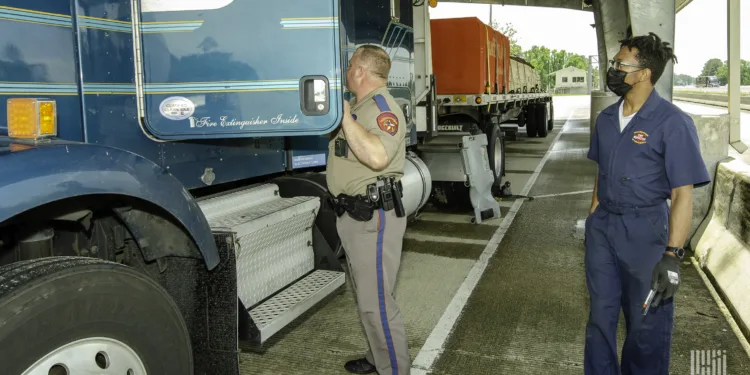WASHINGTON — A proposed new process for drivers and motor carriers to review roadside inspection and crash data compiled by the government has been welcomed by most in the trucking industry but has also raised concerns.
Last year the Federal Motor Carrier Safety Administration proposed an appeals process for Requests for Data Review (RDRs) submitted through FMCSA’s online DataQs system, which allows trucking companies and drivers to request a review of crash and inspection data that requesters believe is incomplete or incorrect.
Based on comments received on the initial proposal, FMCSA sought another round of comments on a revamped version issued in July that shifted most of the review process to the states. The original plan would have allowed requests to be reviewed by FMCSA after it was reviewed and denied after reconsideration by a state agency.
Giving more responsibility for the review process to the states – with the goal of moving the process forward with less delays – also puts more demand on state resources, according to the American Trucking Associations.
“The proposed process may present potential challenges in states with large inspection volumes, such as Texas, California, and New York,” ATA asserted in comments posted by FMCSA on Wednesday.
“Additionally, implementing robust review processes in states with limited staff and small chains of command may be difficult or unfeasible.”
The Truckload Carriers Association pointed out that many states have only one or two people responsible for reviewing all DataQs and RDRs.
“To address both bandwidth and bias concerns, FMCSA and states could … consider using FMCSA-approved, [Certified Director of Safety]-qualified contractors or reviewers from states with lower truck traffic volumes,” TCA suggested. “This approach would not only help maintain impartiality but also ensure that timelines are met consistently across the country.”
TCA also pointed out a potential flaw with state reviewers all coming from the same agency.
“Even with the requirement for more than one reviewer, requestors may still be concerned about ‘department bias’ if all reviewers come from the same agency or department,” TCA stated. “In such cases, there is a risk that the second review simply reaffirms the original decision rather than providing an independent perspective.
“To address this, our members have recommended that at least one reviewer come from a different agency or even from a cross-state jurisdiction, ideally from a state with a smaller volume of truck traffic, to introduce fresh viewpoints and reduce the likelihood of bias.”
A concern for drivers, according to the Owner-Operator Independent Drivers Association, was allowing violations that are being challenged as incorrect to continue to be posted on agency databases during the review process.
“Unmerited violations and inaccurate information that remains on an owner-operator or driver’s safety record can negatively impact their employment or increase their insurance costs, among other consequences,” OOIDA told FMCSA.
FMCSA responded to OOIDA’s recommendation to remove such data that doing so “creates opportunities for requestors to ‘improve’ their safety records in the short term by submitting frivolous RDRs, which would impact the efficacy of the DataQs program and other FMCSA safety programs.”
As a compromise, OOIDA suggested that those requesting a review be permitted to select one RDR every six-months “that would not detrimentally impact any safety rating until the RDR is fully adjudicated,” the group noted.
“FMCSA should also consider other alternatives that would ensure small trucking businesses are not sidelined when challenging violations, especially administrative or clerical errors due to no fault of their own.”
According to FMCSA data, just over 3 million roadside inspections conducted last year uncovered over 5.1 million separate violations, with approximately 18% of those violations severe enough infractions to place a driver or the driver’s truck out of service.
Related articles:
- Crash data involving new truck drivers getting worse
- Trucking tells FMCSA crash reporting presumes drivers guilty
- How to successfully dispute violations with DataQs
Click for more FreightWaves articles by John Gallagher.
The post Trucking questions FMCSA’s proposal to fix flawed safety data appeared first on FreightWaves.

















